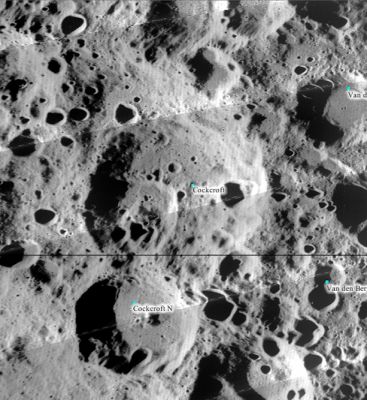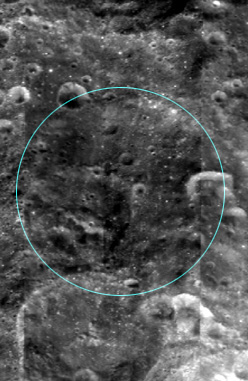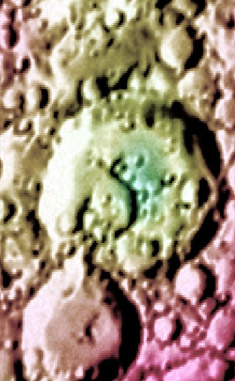Difference between revisions of "Cockcroft"
| (One intermediate revision by the same user not shown) | |||
| Line 5: | Line 5: | ||
|- | |- | ||
| | | | ||
| − | [http://lpod.org/coppermine/displayimage.php?pid=4290&fullsize=1 [[Image: | + | [http://lpod.org/coppermine/displayimage.php?pid=4290&fullsize=1 [[Image:Normal_cockcroft-large.jpg|external image normal_cockcroft-large.jpg]]]<br /> |
| | | | ||
| − | [[Image: | + | [[Image:Cockcroft-2.jpg|cockcroft-2.jpg]]<br /> |
| | | | ||
| − | [[Image: | + | [[Image:Cockcroft-color.jpg|cockcroft-color.jpg]]<br /> |
|} | |} | ||
'''Left:''' ''[http://webgis.wr.usgs.gov/website/apollo_html/viewer.htm Apollo Foot Lunar Orbiter] image from [http://webgis.wr.usgs.gov/website/apollo_html/viewer.htm USGS]. '''Middle:''' Annotated [http://www.mapaplanet.org Clementine] image. '''Right:''' Lidar Color-Coded Topography image -- both from [http://www.mapaplanet.org Map-A-Planet].<br /> <div id="toc"> | '''Left:''' ''[http://webgis.wr.usgs.gov/website/apollo_html/viewer.htm Apollo Foot Lunar Orbiter] image from [http://webgis.wr.usgs.gov/website/apollo_html/viewer.htm USGS]. '''Middle:''' Annotated [http://www.mapaplanet.org Clementine] image. '''Right:''' Lidar Color-Coded Topography image -- both from [http://www.mapaplanet.org Map-A-Planet].<br /> <div id="toc"> | ||
| Line 18: | Line 18: | ||
([[LAC%20zone|LAC zone]] 51A2) ''[http://planetarynames.wr.usgs.gov/images/Lunar/lac_51.pdf USGS Digital Atlas PDF]''<br /> <br /> | ([[LAC%20zone|LAC zone]] 51A2) ''[http://planetarynames.wr.usgs.gov/images/Lunar/lac_51.pdf USGS Digital Atlas PDF]''<br /> <br /> | ||
==Description== | ==Description== | ||
| − | '''Cockcroft''' is a crater of the [[Stratigraphy|pre-Nectarian]] period (~ 4.6 to 3.92 bn years). The appearance of its well-worn rim, along with several major impacts both around its exterior and within its floor show that the crater has a history of alteration beyond initial formation. Impacts, for example, to its south-western sector show how '''Cockcroft N''' has obliterated nearly all of its southern sector, while others to the east and south-east has produced a complex history of bombardment beyond recognition. Some worn terraces can be seen in portions around the crater's interior rim, however, prominant to these would be the main crater-impact in the south-western sector of the floor (nearly half the diameter of '''Cockcroft'''), which itself has subsequently seen several smaller impacts of assorted sizes. No sign of a central peak exist within '''Cockcroft''' for such a sized-crater (93 km in diameter), however, given the above history of alteration and events, the equation for one existing initially at all must surely be one to be pondered over. <span class="membersnap">- | + | '''Cockcroft''' is a crater of the [[Stratigraphy|pre-Nectarian]] period (~ 4.6 to 3.92 bn years). The appearance of its well-worn rim, along with several major impacts both around its exterior and within its floor show that the crater has a history of alteration beyond initial formation. Impacts, for example, to its south-western sector show how '''Cockcroft N''' has obliterated nearly all of its southern sector, while others to the east and south-east has produced a complex history of bombardment beyond recognition. Some worn terraces can be seen in portions around the crater's interior rim, however, prominant to these would be the main crater-impact in the south-western sector of the floor (nearly half the diameter of '''Cockcroft'''), which itself has subsequently seen several smaller impacts of assorted sizes. No sign of a central peak exist within '''Cockcroft''' for such a sized-crater (93 km in diameter), however, given the above history of alteration and events, the equation for one existing initially at all must surely be one to be pondered over. <span class="membersnap">- JohnMoore2</span><br /> <br /> |
==Description: Wikipedia== | ==Description: Wikipedia== | ||
[http://en.wikipedia.org/wiki/Cockcroft_(crater) Cockcroft]<br /> <br /> | [http://en.wikipedia.org/wiki/Cockcroft_(crater) Cockcroft]<br /> <br /> | ||
Latest revision as of 20:08, 16 April 2018
Contents
Cockcroft
| Lat: 31.3°N, Long: 162.6°W, Diam: 93 km, Depth: km, Rükl: (farside) | ||
Images
LPOD Photo Gallery Lunar Orbiter Images Apollo Images
Maps
(LAC zone 51A2) USGS Digital Atlas PDF
Description
Cockcroft is a crater of the pre-Nectarian period (~ 4.6 to 3.92 bn years). The appearance of its well-worn rim, along with several major impacts both around its exterior and within its floor show that the crater has a history of alteration beyond initial formation. Impacts, for example, to its south-western sector show how Cockcroft N has obliterated nearly all of its southern sector, while others to the east and south-east has produced a complex history of bombardment beyond recognition. Some worn terraces can be seen in portions around the crater's interior rim, however, prominant to these would be the main crater-impact in the south-western sector of the floor (nearly half the diameter of Cockcroft), which itself has subsequently seen several smaller impacts of assorted sizes. No sign of a central peak exist within Cockcroft for such a sized-crater (93 km in diameter), however, given the above history of alteration and events, the equation for one existing initially at all must surely be one to be pondered over. - JohnMoore2
Description: Wikipedia
Additional Information
Nomenclature
Sir John Douglas; British nuclear physicist; Nobel laureate (1897-1967).
LPOD Articles
Bibliography


